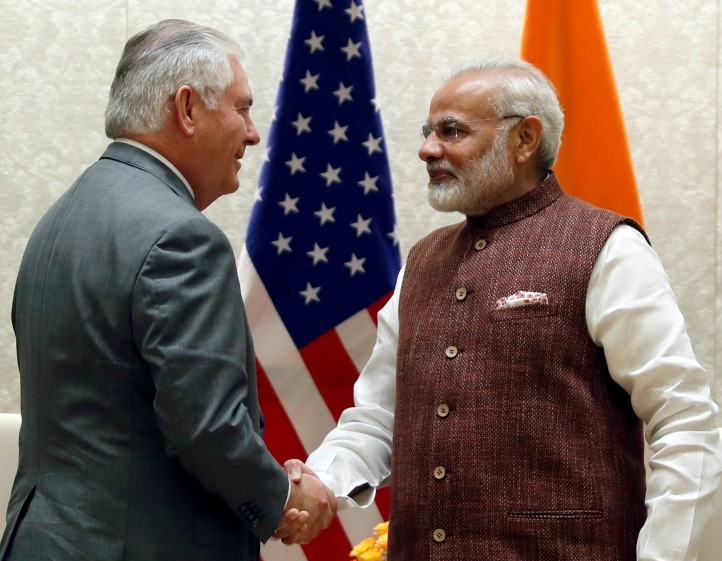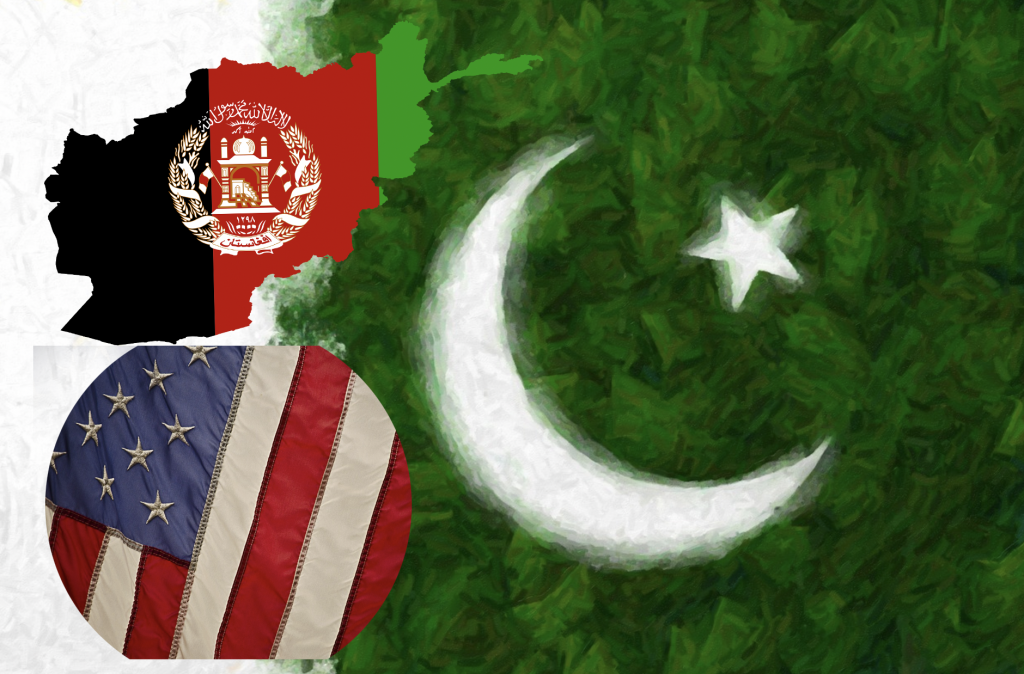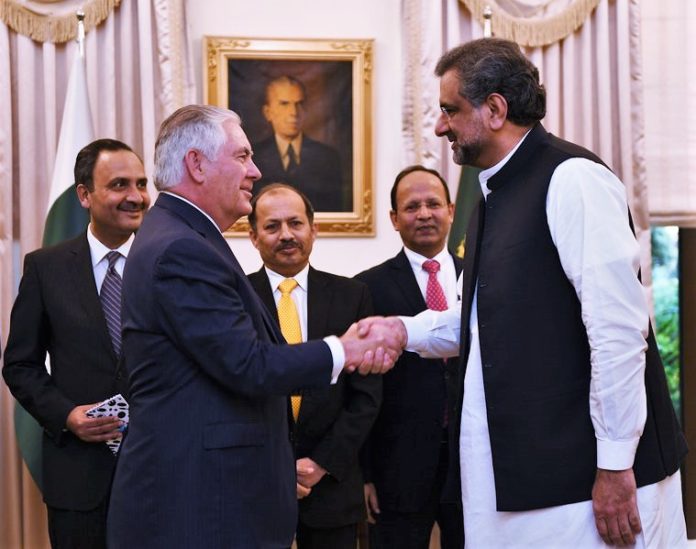While President Trump was touring part of Asia, his wish to entice India and Pakistan “to talk” echoed once again in the mainstream media; this has been his well-articulated electoral promise as well. The Trump administration hopes that better relations between India and Pakistan would allow it to focus on Afghanistan. A fresh, behind the scene effort is underway to re-rail the process of stalled talks after the US Secretary of State Rex Tillerson’s visit to South Asia. Tillerson had informed the Pakistani leadership that the US was willing to encourage such a rapprochement. Nonetheless, there is a stumbling block, the coincidental simultaneous rise of ultra-right political sentiment coupled with American necessity to keep pampering India for an anti-China role has drastically curtailed its otherwise compelling influence over India. Word “K” continues to be a forbidden fruit and the World Bank has once again failed to break the impasse on India violations of Indus Water Treaty. So far, Prime Minister Narendra Modi appears in no mood to give requisite space to brother Trump.
During the fourth round of Pakistan-US bilateral dialogue in Islamabad on November 06, the United States has held out an assurance to Pakistan that the Indian role in Afghanistan would be limited to provision of economic assistance to the war-torn country. This is important, as Pakistan has repeatedly expressed concern over India’s hyped role in the new US strategy, saying its security concerns in the region should be recognized. However, mere assurance is not sufficient because the US is known for turning its eyes away with regard to Indian excesses towards Pakistan via Afghanistan.
India is known for positioning its trained soldiers in Afghanistan under the garb of developmental projects. For example, its “Border Roads Organization” which does a lot of road construction in Afghanistan is staffed by serving and retired military personnel; the same is the staffing pattern in the case of health care and education projects. This means that Indian soldiers are already present. Another, core issue is the increasing footprint of Indian intelligence in Afghanistan which plans and conducts terrorist operations in Pakistan; India also facilitates and finances separatist elements. Pakistan is of the view that giving undue role to India in Afghanistan amounts to insulting the country’s longstanding and sincere contribution, sacrifices and achievements in the war against terrorism.
Indian troop deployment in Afghanistan is not a bed of roses, Indian troops would suffer heavy attrition at the hands of Taliban, also, as a reaction, the Taliban may extend their militancy deep into India. These factors must weigh heavy in the Indian calculus. There is a thin Indian constituency in support of Indian troop deployment in Afghanistan and that too wants it under UN mandate.
Pakistan has borne the brunt of Afghan conflict both in terms of human and material losses, that is why it genuinely believes that its security interests must be kept in view while negotiating a solution to the Afghan problem. This was the red line for Pakistan in extending cooperation with regard to war on terror and there were apprehensions that if the US went ahead with its declared policy of seeking more role for India in Afghanistan there could be serious setback to Pak-US cooperation in the war on terror. Now, apparently, the US has understood Pakistan’s legitimate concerns and is willing to address them.

Now, for Pakistan, there is need to monitor these verbal assurances with on ground actions. As of now there is a well-knit military and intelligence cooperation between Kabul and New Delhi, with a major anti-Pakistan focus. TTP leadership living under the nose of America-installed Afghan regime draws heavily on Indian support for their operational viability and physical survival. There is ample evidence of RAW-NDS collusion to harm core interests of Pakistan in different ways. In the same context, unusual number of Indian consulates in Afghanistan, alongside its military personnel, generate adequate wherewithal to launch and control anti-Pakistan agenda. Hence, Pakistan should have a closer watch on activities of Indian assets in Afghanistan to evaluate the quantum of threat that could emanate from these, and finally keep in place proportionate response.
As for the US and Afghanistan, Joint Operations are off the table and Pakistan has sound reasons for taking that stance. For success of counter terrorism operations in Afghanistan, the US should timely share intelligence data with Pakistan, especially that pertaining to the movement of terrorists and leave the job of taking ground action to Pakistan. Whenever such coordinated operations were conducted the success rate has been pretty high. So far, America has not adopted this facet of military cooperation as a matter of policy, and it has been cooperating on cherry pick style. One takeaway from the successful rescue of Caitlin Coleman and her family is the need for deepening cooperation on intelligence sharing. Pakistan is committed to respond effectively to any actionable intelligence provided by the US. This is the only way forward to test each other’s resolve and commitment to combat terrorism.
While addressing the bilateral forum, Pakistan’s foreign minister said, “Unfortunately, the manner in which the new US policy on Afghanistan and South Asia was enunciated has created needless divergence. Instead of all the discord, what should have been loud and clear is that the ultimate objective for both Pakistan and the US is exactly the same— a stable and secure Afghanistan, at peace with itself and with an ability to deny safe havens to terrorists. Also lost was the fact that Pakistan has consistently argued against a hasty US withdrawal from Afghanistan as had happened in the 90s. This clearly implies that Pakistan wants the US to succeed in its efforts for a stable and secure Afghanistan”.
Afghanistan ravaged by conflict for the last four decades deserves an all-out commitment to peace and reconciliation. The current environment in our region and beyond is challenging and complex; also, the global order is in a flux. During such uncertain times, all countries striving for peace in Afghanistan should capitalize on traditional partnerships that have delivered effectively during key moments in our history.
And in this context, the interests of Pakistan and America converge completely in Afghanistan, though both differ on the strategy for achieving it. America’s condition based approach is primarily a strategy of denial and strategic stalemate, making it that much more difficult to evolve peace mechanisms. Moreover, with guaranteed American support, such a methodology does not motivate the Afghan government to strive for effective peace and reconciliation effort.
Afghanistan has enormous challenges to grapple with. Some of these are: corruption, restructuring existing state institutions alongside raising of a couple of new ones, transforming its war economy into a progressive corporate enterprise, checking and reversing record poppy growth, smoothening ethno-tribal divisions, and expanding its writ over ungoverned swaths of land.

Each one of these is a daunting challenge in its own right. The pathway to cooperation is quite clear. The US and Afghanistan should understand that it is unfair to name Pakistan for all that afflicts Afghanistan; and that Indian role can only complicate matters. Apart from these points, there is broad agreement on major Afghanistan related issues: border management; return of refugees; safe havens in Afghanistan; and how to deal with so called safe havens in Pakistan. Pakistan, after great sacrifices of men, material and image, has been able to dismantle terrorist networks and establish the writ of the government across the length and breadth of the country. It could now claim with a degree of certainty that there is no organized presence of terrorists within Pakistan. However, considering the porous border and millions of refugees, there may still be remnants of these element, and the only way to deal with them is more intelligence cooperation and effective movement regulation across Pak-Afghan border.
Pakistan’s fight against extremism and terrorism is purely in its own self-interest. However, there is a need to empathize that though Pakistan has made significant gains, extremism and terrorism is a global phenomenon and would require international cooperation for times to come.
There is broad agreement on an Afghan-led and Afghan-owned peace and reconciliation process. There is need to strengthen various ongoing processes be they Heart of Asia, Quadrilateral Cooperation Group, or any other international forum. However, major work has to be done within Afghanistan and Pakistan along with other countries can only facilitate such a process.
Pakistan has generated mammoth counter terrorism effort and even now it is fielding the world’s largest military resource to fight the menace of terror. And in the process, it has lost tens of thousands of lives. The gains are fairly good that Pakistan has made at the cost of tremendous sacrifices. Pakistan’s law and order situation is fast returning to normal and as a side benefit, its economy has turned around.
In the context of weighing prospects of a meaningful dialogue between Pakistan and India, the track record is poor, India uses it to ward-off international pressure, and spares no pretext to disrupt the process. Pakistan is not interested in continuation of this unending talks-no talks cycle. It looks for a meaningful third party arbitration to resolve the simmering issues.




